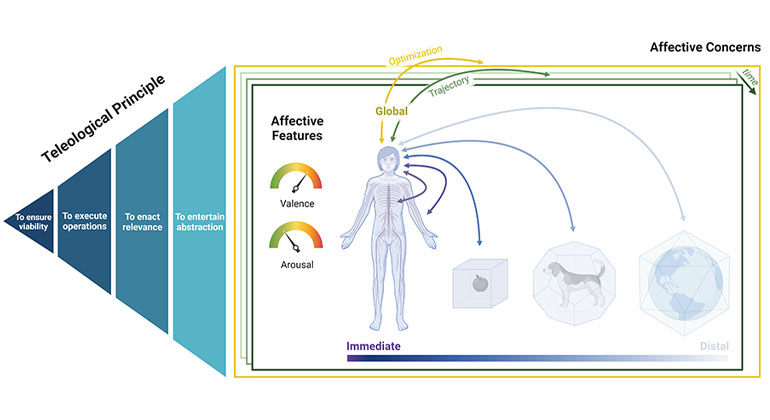Human Brain May Contain a Map for Social Navigation
Study reveals how the hippocampus contributes to social behavior
The brain region that helps people tell whether an object is near or far may also guide how emotionally close they feel to others and how they rank them socially, according to a study conducted at the Icahn School of Medicine at Mount Sinai and published today in the journal Neuron. The findings promise to yield new insights into the social deficits that accompany psychiatric disorders like schizophrenia and depression.
The study focused on evidence for the existence of a “social map” in the hippocampus, the part of the brain that remembers locations in physical space and the order in which events occur. While previous studies had suggested that the hippocampus records a 3-dimensional representation of our surroundings when a key set of nerve cells fires, how the hippocampus contributes to social behavior had not been previously described.
“By quantifying the response patterns of people making decisions based on social interactions, we found that the hippocampus tracks relationships, intimacy and hierarchy within a kind of ‘social map’,” says Rita Tavares, PhD, postdoctoral fellow in the Schiller Laboratory of Affective Neuroscience at the Icahn School of Medicine at Mount Sinai. “Our data suggests a common mechanism for how the brain codes for physical space, time and for social relationships.”
Previous social psychology studies and theory had identified two main factors that define social relationships: power (competence, dominance, hierarchy) and affiliation (intimacy, trustworthiness, love). In the new study, Mount Sinai researchers gauged participants’ sense of affiliation and power using a social space model: in a role-playing game, healthy subjects were tasked with finding a new home and job through power and affiliation interactions with virtual cartoon characters.
To quantify social interactions, study investigators used power and affiliation as the x and y axes of a two-dimensional graph where they recorded the social coordinates of each interaction. Each time the participant interacted with a character during the game, that character’s coordinates moved along a trajectory of greater or lesser intimacy or power. The researchers designed a mathematical analysis where they asked whether the brain activity being measured in the functional neuroimaging (fMRI) scanner tracked those changing social coordinates. The research team found a correlation between hippocampal activity and movement through the abstract social “space.”
“We found that participants who reported better social skills showed better hippocampal tracking of the movement of the game characters through that social space,” says Daniela Schiller, PhD, Assistant Professor of Psychiatry and Neuroscience and Lab Director of the Schiller Laboratory for Affective Neuroscience at the Icahn School of Medicine at Mount Sinai. “Our results suggest that the hippocampus is crucial for social cognition and imply that beyond framing physical locations, the hippocampus computes a more general, inclusive, abstract and multidimensional social map.”
Navigating through social space may be relevant to many disorders that impair social cognition, such as sociopathy, borderline personality disorder, schizophrenia, depression and autism. Many of these disorders are known to involve hippocampal dysfunction. The current study results predict that an impaired geometric representation of social space in the hippocampus may accompany social dysfunction across psychiatric populations. Further exploration of these hypotheses could lead to improved diagnostic and therapeutic options for several psychiatric populations.
About the Mount Sinai Health System
Mount Sinai Health System is one of the largest academic medical systems in the New York metro area, with 48,000 employees working across seven hospitals, more than 400 outpatient practices, more than 600 research and clinical labs, a school of nursing, and a leading school of medicine and graduate education. Mount Sinai advances health for all people, everywhere, by taking on the most complex health care challenges of our time—discovering and applying new scientific learning and knowledge; developing safer, more effective treatments; educating the next generation of medical leaders and innovators; and supporting local communities by delivering high-quality care to all who need it.
Through the integration of its hospitals, labs, and schools, Mount Sinai offers comprehensive health care solutions from birth through geriatrics, leveraging innovative approaches such as artificial intelligence and informatics while keeping patients’ medical and emotional needs at the center of all treatment. The Health System includes approximately 9,000 primary and specialty care physicians and 11 free-standing joint-venture centers throughout the five boroughs of New York City, Westchester, Long Island, and Florida. Hospitals within the System are consistently ranked by Newsweek’s® “The World’s Best Smart Hospitals, Best in State Hospitals, World Best Hospitals and Best Specialty Hospitals” and by U.S. News & World Report's® “Best Hospitals” and “Best Children’s Hospitals.” The Mount Sinai Hospital is on the U.S. News & World Report® “Best Hospitals” Honor Roll for 2024-2025.
For more information, visit https://www.mountsinai.org or find Mount Sinai on Facebook, Instagram, LinkedIn, X, and YouTube.

Global Taskforce of Scientists Develop a Unifying Framework for the Human Affectome
Feb 12, 2024 View All Press ReleasesNew Research Suggests Your Imagination Really Can Set You Free From Fear
Nov 21, 2018 View All Press Releases